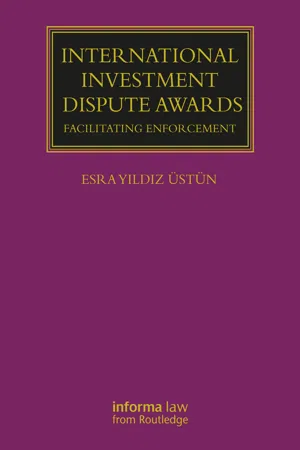
International Investment Dispute Awards
Facilitating Enforcement
Esra Yildiz Üstün
- 176 pagine
- English
- ePUB (disponibile sull'app)
- Disponibile su iOS e Android
International Investment Dispute Awards
Facilitating Enforcement
Esra Yildiz Üstün
Informazioni sul libro
This book examines how international investment arbitral awards can be facilitated. It sets out to achieve a fuller conceptualisation and theorisation of awards through a discussion of relevant issues and themes, as well as demonstrating how they can be achieved through a comparative approach that has been conceived and developed with reference to existing deficiencies in the research literature. This contribution is particularly important given the worldwide emergence of investment arbitration as a powerful form of alternative dispute resolution (ADR).
The book ultimately seeks to explore and develop solutions that can be directed to an existing oversight and deficit within the international investment architecture. In considering the advantages and disadvantages of each 'solution', it will work towards an approach best-suited to upholding the interest of the victorious party at the enforcement stage. The enforcement of arbitral awards on a voluntary basis has proven to be insufficient, and this created a real and ongoing shortcoming that needs to be addressed. International Investment Dispute Awards: Facilitating Enforcement therefore seeks to directly influence existing practice on the part of international institutions, with the intention of helping to develop a more effective resolution.
The readerships for this book will include arbitration practitioners, policy-makers (including treaty drafters), academics and postgraduate students interested in the enforcement of investment arbitral awards.